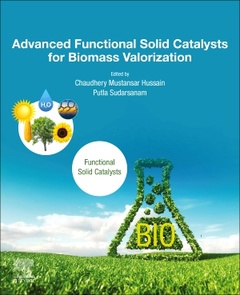Advanced Functional Solid Catalysts for Biomass Valorization
Coordonnateurs : Mustansar Hussain Chaudhery, Sudarsanam Putla

Advanced Functional Solid Catalysts for Biomass Valorization presents the basic concepts in catalysis (homogeneous, heterogeneous, and enzymatic) and the properties of various kinds of heterogeneous solid catalysts, including their structure, porosity, particle size, BET surface area, acid-base, and redox properties. Useful information about biorefineries, types of biomass feedstocks, their structures and properties as well as about several potential catalytic routes for biomass upgrading to useful fuels and chemicals is provided in this book. Importantly, this book covers the most recent developments toward functionalization of various solid catalysts, optimization of catalysts? properties, developing cascade catalytic strategies, exploring reaction kinetics/mechanisms, and evaluating catalysts? stability/reusability during biomass upgrading. Current challenges and opportunities for the future biorefineries as well as for the design of advanced functional solid catalysts are critically discussed.
1. The role of catalysis in green synthesis of chemicals for sustainable future
2. Production techniques of functional solid catalysts
3. Properties of functional solid catalysts and their characterization using various analytical techniques
4. Classification, characterization, and properties of edible and non-edible biomass feedstocks
5. Heteroatom modified carbon nanomaterials as metal-free catalysts for lignocellulosic carbohydrate valorization
6. Zeolite-related catalysts for biomass-derived sugar valorization
7. Mesoporous silica-related catalysts for biomass valorization
8. Metal-organic frameworks-based catalysts for biomass valorization
9. Functional magnetic catalysts for the synthesis of biomass-derived fuels and chemicals
10. Challenges and future prospects in heterogeneous catalysis for biorefinery technologies
Dr. Putla Sudarsanam is a Scientist at the Catalysis Division, CSIR-National Chemical Laboratory, Pune, Maharashtra, India. He obtained his PhD in Chemistry, 2015 from CSIR-Indian Institute of Chemical Technology, Hyderabad, Telangana, India. He has published about 55 peer-reviewed journal articles and 4 book chapters (Citations: 2150 and H-index: 30). His research mainly focuses on developing advanced solid catalysts for biomass valorization, CO2-to-chemicals conversion, and environmental catalysis. He has been honored for his outstanding contributions with numerous prestigious awards/fellowships, including Marie Sklodowska-Curie Fellowship-2016 (Belgium), Leibniz-DAAD Postdoc Fellowship-2016 (Germany), Best PhD Thesis Award-2015 (The Catalysis Society of India), EuropaCat PhD Student Award-2013 (XIth European Congress on Catalysis, France), and Endeavour Research Fellowship-2013 (Australia).
- Describes catalysis as a promising technology for the development of eco-friendly and economically viable strategies for several important energy and environmental applications.
- Covers heterogeneous solid catalysts because of their versatile benefits in terms of catalysts’ synthesis, production cost, stability, and reusability as compared to homogeneous liquid catalysts.
- Provides promising strategies for the design of new catalytic materials, such as carbon materials, metal–organic frameworks, zeolites, and mesoporous silicas.
- Describes functional solid catalysts for developing one-pot cascade processes for efficient biomass valorization and other vital chemical transformations.
Date de parution : 05-2020
Ouvrage de 274 p.
19x23.3 cm
Thème d’Advanced Functional Solid Catalysts for Biomass Valorization :
Mots-clés :
active sites; autogenous pressure; biomass; biomass conversion; biomaterials; biorefinery; carbohydrates utilization; carbon; carbon materials; catalysis; catalysts; cellulose; classification; dehydration; dry-gel; energy; FDCA; fossil sources; green chemistry; heteroatom modification; heterogeneous catalysis; HMF; iron oxide with acid functional groups; LA; Lewis and Brønsted acid; magnetic catalysts; mesoporous; mesoporous silica; metal-free catalyst; metal-organic frameworks; properties; purity; pyrolysis and renewable fuels; reaction mechanism; solid; solid acid catalysts; spectroscopic; sugar isomerization; techniques; thermochemical; valorization; zeolites; zeolitic materials


